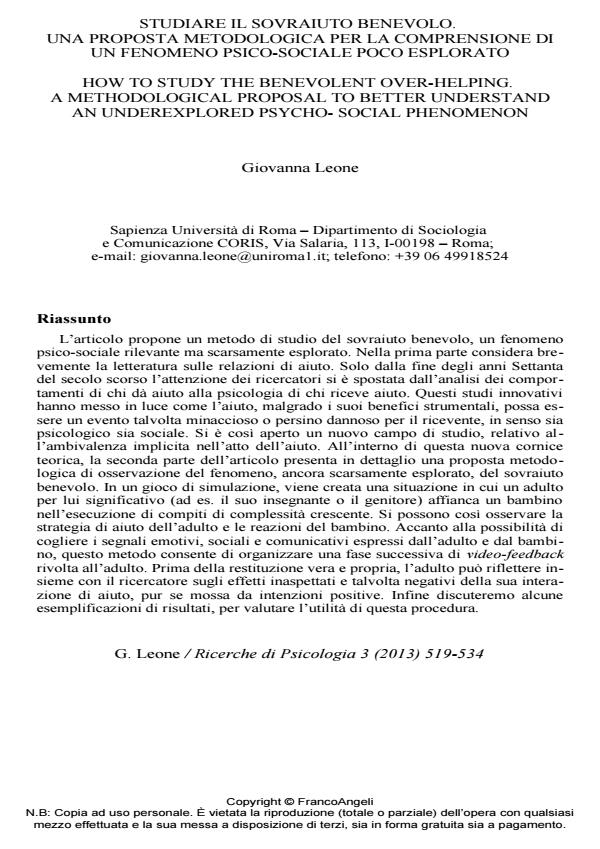Studiare il sovraiuto benevolo. Una proposta metodologica per la comprensione di un fenomeno psico-sociale poco esplorato how to study the benevolent over-helping.
Titolo Rivista RICERCHE DI PSICOLOGIA
Autori/Curatori
Anno di pubblicazione 2014 Fascicolo 2013/3
Lingua Italiano Numero pagine 16 P. 519-534 Dimensione file 226 KB
DOI 10.3280/RIP2013-003008
Il DOI è il codice a barre della proprietà intellettuale: per saperne di più
clicca qui
Qui sotto puoi vedere in anteprima la prima pagina di questo articolo.
Se questo articolo ti interessa, lo puoi acquistare (e scaricare in formato pdf) seguendo le facili indicazioni per acquistare il download credit. Acquista Download Credits per scaricare questo Articolo in formato PDF

FrancoAngeli è membro della Publishers International Linking Association, Inc (PILA), associazione indipendente e non profit per facilitare (attraverso i servizi tecnologici implementati da CrossRef.org) l’accesso degli studiosi ai contenuti digitali nelle pubblicazioni professionali e scientifiche.
L’articolo propone un metodo di studio del sovraiuto benevolo, un fenomeno psico-sociale rilevante ma scarsamente esplorato. Nella prima parte considera brevemente la letteratura sulle relazioni di aiuto. Solo dalla fine degli anni Settanta del secolo scorso l’attenzione dei ricercatori si e spostata dall’analisi dei comportamenti di chi da aiuto alla psicologia di chi riceve aiuto. Questi studi innovativi hanno messo in luce come l’aiuto, malgrado i suoi benefici strumentali, possa essere un evento talvolta minaccioso o persino dannoso per il ricevente, in senso sia psicologico sia sociale. Si e cosi aperto un nuovo campo di studio, relativo all’ambivalenza implicita nell’atto dell’aiuto. All’interno di questa nuova cornice teorica, la seconda parte dell’articolo presenta in dettaglio una proposta metodologica di osservazione del fenomeno, ancora scarsamente esplorato, del sovraiuto benevolo. In un gioco di simulazione, viene creata una situazione in cui un adulto per lui significativo (ad es. il suo insegnante o il genitore) affianca un bambino nell’esecuzione di compiti di complessita crescente. Si possono cosi osservare la strategia di aiuto dell’adulto e le reazioni del bambino. Accanto alla possibilita di cogliere i segnali emotivi, sociali e comunicativi espressi dall’adulto e dal bambino, questo metodo consente di organizzare una fase successiva di video-feedback rivolta all’adulto. Prima della restituzione vera e propria, l’adulto puo riflettere insieme con il ricercatore sugli effetti inaspettati e talvolta negativi della sua interazione di aiuto, pur se mossa da intenzioni positive. Infine discuteremo alcune esemplificazioni di risultati, per valutare l’utilita di questa procedura.
Parole chiave:Sovraiuto benevolo, gioco di simulazione, video-feedback, altruismo, emozioni.
, Studiare il sovraiuto benevolo. Una proposta metodologica per la comprensione di un fenomeno psico-sociale poco esplorato how to study the benevolent over-helping. in "RICERCHE DI PSICOLOGIA " 3/2013, pp 519-534, DOI: 10.3280/RIP2013-003008